- Home
- Harry Leon Wilson
The Wrong Twin Page 15
The Wrong Twin Read online
Page 15
CHAPTER XV
Wilbur Cowen had hesitated in the matter of war. He wanted to be in abattle--had glowed at the thought of fighting--but if the war was goingto be stopped in its beginning, what would be the use of starting? Andhe was assured and more than half believed that it would be stopped.Merle Whipple was his informant--Merle had found himself. The war wasto be stopped by the _New Dawn_, a magazine of which Merle had beenassociate editor since shortly after his release from college.
Merle, on that afternoon of golf with Wilbur, had accurately forecasthis own future. Confessing then that he meant to become a great writer,he was now not only a great writer but a thinker, in the true sense ofthe word. He had taken up literature--"not muck like poetry, but seriousliterature"--and Whipple money had lavishly provided a smart littlecraft in which to embark. The money had not come without some bewilderedquestioning on the part of those supplying it. As old Sharon said, theWhipple chicken coop had hatched a gosling that wanted to swim instrange waters; but it was eventually decided that goslings were meantto swim and would one way or another find a pond. Indeed, Harvey Whipplewas prouder of his son by adoption than he cared to have known, andlistened to him with secret respect, covered with perfunctory businesshints. He felt that Merle was above and beyond him. The youth, indeed,made him feel that he was a mere country banker.
In the city of New York, after his graduation, Merle had comeinto his own, forming a staunch alliance with a small circle ofintellectuals--intelligentzia, Merle said--consecrated to the cause ofAmerican culture. He had brought to Newbern and to the amazed HarveyWhipple the strange news that America had no native culture; that it wasraw, spiritually impoverished, without national self-consciousness; withbut the faintest traces of art in any true sense of the word. HarveyWhipple would have been less shocked by this disclosure, momentousthough it was, had not Merle betrayed a conviction that his life workwould now be to uphold the wavering touch of civilization.
This brought the thing home to Harvey D. Merle, heading his valiantlittle band of thinkers, would light a pure white flame to flushAmerica's spiritual darkness. He would be a vital influence, teachingmen and women to cultivate life for its own sake. For the cheap andtawdry extravagance of our national boasting he would substitute achastening knowledge of our spiritual inferiority to the older nations.America was uncreative; he would release and nurse its raw creativeintelligence till it should be free to function, breaking newintellectual paths, setting up lofty ideals, enriching our common lifewith a new, self-conscious art. Much of this puzzled Harvey D. and hisfather, old Gideon. It was new talk in their world. But it impressedthem. Their boy was earnest, with a fine intelligence; he left themstirred.
Sharon Whipple was a silent, uneasy listener at many of these talks. Hedeclared, later and to others, for Merle was not his son, that the youngman was highly languageous and highly crazy; that his talk was thecrackling of thorns under a pot; that he was a vain canter--"forevercanting," said Sharon--"a buffle-headed fellow, talking, bragging." Hewas equally intolerant of certain of Merle's little band offorward-looking intellectuals who came to stay week-ends at the WhippleNew Place. There was Emmanuel Schilsky, who talked more pithily thanMerle and who would be the editor-in-chief of the projected _New Dawn_.Emmanuel, too, had come from his far-off home to flush America'sspiritual darkness with a new light. He had written much about ourshortage of genuine spiritual values; about "the continual frustrationsand aridities of American life." He was a member of various groups--theImagist group, the Egoist group, the Sphericists, other groups piquantlynamed; versed in the new psychology, playing upon the word "pragmatism"as upon a violin.
Sharon Whipple, the Philistine, never quite knew whether pragmatism wasapproved or condemned by Schilsky, and once he asked the dark-facedyoung man what it meant. He was told that pragmatism was a method, andfelt obliged to pretend that this enlightened him. He felt a reluctantrespect for Schilsky, who could make him feel uncomfortable.
And there was the colourful, youngish widow, Mrs. Truesdale, who wrotefree verse about the larger intimacies of life, and dressed noticeably.She would be a contributing editor of the _New Dawn_, having as herspecial department the release of woman from her age-long slavery tocertain restraints that now made her talked unpleasantly about if shedared give her soul free rein. This lady caused Sharon to wonder aboutthe departed Truesdale.
"Was he carried away by sorrowing friends," asked Sharon, "or did he gettired one day and move off under his own power?" No one ever enlightenedhim.
Others of the younger intelligentzia came under his biased notice. Hespoke of them as "a rabble rout," who lived in a mad world--"and Godbless us out of it."
But Sharon timed his criticism discreetly, and the _New Dawn_ lit itspure white flame--a magazine to refresh the elect. Placed superblybeyond the need of catering to advertisers, it would adhere to rigorousstandards of the true, the beautiful. It would tell the truth as noother magazine founded on gross commercialism would dare to do. It saidso in well-arranged words. The commercial magazines full well knew thehideous truth, but stifled it for hire. The _New Dawn_ would be honest.
The sinister truth about America as revealed in the initial number ofthe brave new venture was that America was crude, blatant, boastful,vulgar, and money-grubbing. We were without ideals beyond the dollar;without desires save those to be glutted by material wealth. It was thehigh aim of the _New Dawn_--said the associate editor, Merle DaltonWhipple--to dethrone the dollar, to hasten and to celebrate the passingof American greed.
Not until the second number was it revealed that the arch criminals wereto be found in the exploiting class, a sinister combination,all-powerful, working to the detriment of the common people; anindustrial oligarchy under whose rule the cowed wage slave toiled forhis crust of bread. This number unflinchingly indicted the capitalisticruling class; fearlessly called upon the exploited masses to rise andthrow off the yoke put upon them by this nefarious plunderbund. Theworker's plight was depicted with no sparing of detail--"the slavesgroaning and wailing in the dark the song of mastered men, the sullen,satanic music of lost and despairing humanity."
Succeeding numbers made it plain that the very republic itself had beenfounded upon this infamy. Our Revolutionary War had marked the triumphof the capitalistic state--the state that made property sovereign. TheRevolutionary fathers had first freed themselves from English creditors,then bound down as their own debtors an increasing mass of the Americanpopulation. The document known as the Constitution of the United Stateshad been cunningly and knowingly contrived to that end, thus thrustingupon us the commercial oligarchy which persisted to this day. It hadplaced the moneyed classes securely in the saddle, though with finephrases that seemed not to mean this.
"A conscious minority of wealthy men and lawyers, guided by the geniusof Washington, Franklin, Hamilton, and Madison," had worked their fulldesign upon the small farmer and the nascent proletariat; we had sincebeen "under the cult and control of wealth."
After this ringing indictment it surprised no Whipple to read that wehad become intolerant, materialistic, unaesthetic. Nor was it any wonderthat we were "in no mood to brook religious or social dissension." Withsuch a Constitution fraudulently foisted upon us by the money-lovingfathers of the Revolution, it was presumably not to be expected that weshould exhibit the religious tolerance of contemporary Spain or Italy orFrance.
"Immersed in a life of crass material endeavour," small wonder that theAmerican had remained in spiritual poverty of the most debasing sortuntil the _New Dawn_ should come to enrich him, to topple in ruins anexploiting social system.
Now the keen eyes of young America, by aid of the magnifying lenssupplied by Emmanuel Schilsky, would detect the land of the free to bein fact a land of greedy and unscrupulous tyrants; the home of the bravea home of economic serfs. Young America, which fights for the sanctityof life, solid and alive with virile beauty, would revolt and destroythe walls of the capitalistic state, sweeping away the foul laws thatheld private prope
rty sacred. They would seek a cure for the falsehoodof modern life in a return to Nature, a return to the self where truthever is. They would war with the privilege and ascendancy of the groupover the individual conscience. Already the exploiting class, as itneared the term of its depleted life, was but a mass of purulence.Society was rotten, the state a pious criminal, the old truths tawdrylies. Everywhere the impotence of senility--except in young America. Wefaced the imminence of a vast breaking-up. The subtlest oligarchy ofmodern times was about to crumble. The revolution was at hand.
* * * * *
A succeeding number of the _New Dawn_ let out the horrid truth about thewar, telling it in simple words that even Wilbur Cowan could understand.Having sold munitions to the warring nations, we must go in to save ourmoney. In short, as the _New Dawn_ put it: "The capitalistic rulingclasses tricked the people into war." It was to be a war waged forgreed. Young America, not yet perusing in large enough numbers the _NewDawn_, was to be sent to its death that capital might survive--thedollar be still enthroned. But the _New Dawn_ was going to see aboutthat. Young America would be told the truth.
Two of the Whipples were vastly puzzled by these pronouncements, andnot a little disquieted. Old Gideon and Harvey D. began to wonder if byany chance their boy, with his fine intellect, had not been misled.Sharon was enraged by the scandalous assertions about George Washington,whom he had always considered a high-minded patriot. He had neversuspected and could not now be persuaded that Washington had baselytricked the soldiers of the Revolution into war so that the capitalisticclass might prevail in the new states. Nor would he believe that theframers of the Constitution had consciously worded that document with aview to enslaving the common people. He was a stubborn old man, and notaware of his country's darkness. Perhaps it was too much to expect thatone of his years and mental habit should be hospitable to these newlyfound truths.
He was not young America. He had thought too long the other way. Beingof a choleric cast, he would at times be warmed into regrettableoutbursts of opinion that were reactionary in the extreme. Thus when hediscussed with Gideon and Harvey D. the latest number of themagazine--containing the fearless exposure of Washington's chicanery--hespoke in terms most slighting of Emmanuel Schilsky. He meant his wordsto lap over to Merle Whipple, but as the others were still proud--if ina troubled way--of the boy's new eminence, he did not distinguish himtoo pointedly. He pretended to take it all out on Emmanuel, whom hedeclared to be no fair judge of American history. The other Whippleswere beginning to suspect this but were not prepared to admit it eitherto Sharon or to each other. For the present they would defend Emmanuelagainst the hot-headed aspersions of the other.
"You said yourself, not a month ago," expostulated Harvey D., "that hewas a smart little Jew."
Sharon considered briefly.
"Well," he replied, "I don't know as I'd change that--at least not much.I'd still say the same thing, or words to that effect."
"Just how would you put it now?" demanded Gideon, suavely.
Sharon brightened. He had hoped to be asked that.
"The way I'd put it now--having read a lot more of his new-dawning--I'dsay he was a little Jew smarty."
The other Whipples had winced at this. The _New Dawn_ was assuredly notthe simple light-bringer to America's spiritual darkness that they hadsupposed it would be; but they were not yet prepared to believe theworst.
"If only they wouldn't be so extreme!" murmured the troubled Harvey D."If only they wouldn't say the country has been tricked into war bycapital."
"That's a short horse and soon curried," said Sharon. "They can't say itif you quit paying for it."
"There you are!" said Harvey D. "Merle would say that that's an exampleof capitalism suppressing the truth. Of course I don't know--maybe itis."
"Sure! Anyway, it would be an example of capital suppressing something.Depends on what you call the truth. If you think the truth is thatGermany ought to rule the earth you got it right. That's what all thesepacifists and anti-militaries are arguing, though they don't let on tothat. Me, I don't think Germany ought to rule the earth. I think sheought to be soundly trounced, and my guess is she's goin' to be.Something tells me this _New Dawn_ ain't goin' to save her from hercome-uppance. I tell you both plain out, I ain't goin' to have amagazine under my roof that'll talk such stuff about George Washington,the Father of his Country. It's too scandalous."
Thus the _New Dawn_ lost a subscriber, though not losing, it should besaid, a reader. For Sharon Whipple, having irately stopped hissubscription by a letter in which the editor was told he should beashamed of himself for calling George Washington a crook that way,thereafter bought the magazine hurriedly at the Cut-Rate Pharmacy andread every word of it in secret places not under his roof.
Wilbur Cowan, though proud of the _New Dawn_ because his brother's nameadorned it, had nevertheless failed to profit by its teachings. He wasprepared to admit that America groped in spiritual darkness which the_New Dawn_ would flush with its pure white light; he could not havecontended with any authority that it was not a land of dollar hunters,basely materialistic, without ideals, artistically impoverished, anddevoid of national self-consciousness, whatever that meant. These thingswere choice words to him, nothing more; and he had no valid authority onwhich to deny that the country was being tricked into war by theInterests, something heinous that the _New Dawn_ spelled with a capitalletter. In a way he believed this, because his brother said so. Hisbrother had been educated. He even felt shame-faced and apologetic abouthis resolve to enter the fight.
But this resolve was stanch; he wanted to fight, even if he had beentricked by Wall Street into feeling that way. The _New Dawn_ said he hadbeen tricked, and he supposed it was true, even if he couldn't clearlydetect how Wall Street had made Germany pursue the course that made himwant to fight. So far as his direct mental processes could inform him,the only trickery involved had been employed by Germany and SpikeBrennon. Germany's behaviour was more understandable than the _NewDawn_, and Spike Brennon was much simpler in his words. Spike said itwas a dandy chance to get into a real scrap, and all husky lads shouldbe there in a split second at the first call. Perhaps Wall Street hadtricked Spike into tricking Wilbur Cowan. Anyway, Spike was determined.
Their decision was made one day after a brisk six rounds of mimicbattle. They soaped and bathed and dried their bodies. Then theyrested--sitting upon up-ended beer kegs in the storeroom of PeglegMcCarron--and talked a little of life. Spike for a week had beenlaconic, even for him, and had taken little trouble to pull his punches.To-day he revealed that the Interests had triumphed over his simplemind. He was going and going quick. He recovered a morsel of gum frombeneath the room's one chair, put it again into commission, and spokedecisively.
"I'm goin' quick," he said.
"When do we leave?" demanded Wilbur.
"I'm leavin' in two days."
"We're leaving in two days."
They chewed gum for an interval.
"Way it is," said Spike at length, "I'm nothing but about a fourth-raterin my game. I wasn't never a first-rater. I used to kid myself I was,but handier guys took it out of me. Never was better than a third-rater,I guess. But maybe in this other game I could git to be a first-rater.You can't tell. I still got the use of myself, ain't I? And I wouldn'tbe so much afraid as a guy who never fought no fights at all. It looksgood to me. Of course I don't know much about this here talk youread--makin' the world safe for Democrats, and so forth, but they'scertain parts of it had ought to be made unsafe for Germans. I got thatmuch straight."
"Where do we go from here?" demanded Wilbur Cowan.
"N'York," said Spike. "Enlist there. I got a friend in Tamm'ny will seewe git treated right."
"Treated right--how?"
"Sent over quick--not kept here. This guy is high up; he can get ussent."
"Good!"
"Only thing worries me," said Spike--"sleepin' out of doors. It ain'thealthy. They tell me you sleep any old place--o
n the ground or in achicken coop--makes no matter. I never did sleep out of doors, and Ihate to begin now; but I s'pose I got to. Mebbe, time we git there,they'll have decent beds. I admit I'm afraid of sleepin' out on theground. It ain't no way to keep your health."
He ruminated busily with the gum.
"Another thing, kid, you got to remember. In the box-fightin' gamesometimes even second money is good. I pulled down a few nice purses inmy time. But this here gun-fightin' stuff, it's winner take all everytime. In a gun fight second money is mud. Remember that. And we ain'tgot the education to be officers. We got to do plain fightin'."
"Plain fighting!" echoed Wilbur. "And I'll tell you another thing. Fromwhat I hear they might put me to driving a car, but you bet I ain'tgoing to take that long trip and get seasick, probably, just to foolround with automobiles. I'm going to be out where you are--plainfighting. So remember this--I don't know a thing about cars or motors.Never saw one till I come into the Army."
"You're on!" said Spike. "Now let's eat while we can. They tell me overin the war your meals is often late."
They ate at T-bone Tommy's, consuming a vast quantity of red meat withbut a minor accompaniment of vegetables. They were already soldiers.They fought during the meal several sharp engagements, from which theyemerged without a scratch.
"We'll be takin' a lot of long chances, kid," cautioned Spike. "Firstthing we know--they might be saying it to us with flowers."
"Let 'em talk!" said the buoyant Wilbur. "Of course we'll get intotrouble sooner or later."
"Sure!" agreed Spike. "Way I look at it, I got about one good fight leftin me. All I hope is, it'll be a humdinger."
Later they wandered along River Street, surveying the little town withnew eyes. They were far off---"over where the war was taking place," asSpike neatly put it--surveying at that long range the well-rememberedscene; revisiting it from some remote spot where perhaps it had beensaid to them with flowers.
"We'd ought to tell Herman Vielhaber," said Spike. "Herman's a Heinie,but he's a good scout at that."
"Sure!" agreed Wilbur.
They found Herman alone at one of his tables staring morosely at anuntouched glass of beer. The Vielhaber establishment was alreadysuffering under the stigma of pro-Germanism put upon it by certain ofthe watchful towns-people. Judge Penniman, that hale old invalid, hadeven declared that Herman was a spy, and signalled each night to otherspies by flapping a curtain of his lighted room above the saloon. Thejudge had found believers, though it was difficult to explain just whatinformation Herman would be signalling and why he didn't go out and tellit to his evil confederates by word of mouth. Herman often found tradedull of an evening now, since many of his old clients would patronizehis rival, Pegleg McCarron; for Pegleg was a fervent patriot whodeclared that all Germans ought to be in hell. Herman greeted thenewcomers with troubled cordiality.
"Sed down, you boys. What you have? Sasspriller? All right! Mamma, twosassprillers for these young men."
Minna Vielhaber brought the drink from the bar. Minna had red eyes, andperformed her service in silence, after which she went moodily back toher post.
They drank to Herman's health and to Minna's, and told of theirdecision.
"Right!" said Herman. "I give you right." He stared long at his beer. "Itell you, boys," he said at last, "mamma and me we got in a hard place,yes. Me? I'm good American--true blue. I got my last papers twenty-twoyears ago. I been good American since before that. Mamma, too. Bothgood. Then war comes, and I remember the Fatherland--we don't neverfurgit that, mind you, even so we are good Americans. But I guess mebbeI talk a lot of foolishness about Germany whipping everybody she fightwith. I guess I was too proud of that country that used to be mine. Youknow how it is, you boys; you remember your home and your people kind ofnice, mebbe."
"Sure!" said Spike. "Me? I was raised down back of the tracks inBuffalo--one swell place fur a kid to grow up--but honest, sometimes Igit waked up in the night, and find m'self homesick fur that rottendump. Sure, I know how you feel, Herman."
Herman, cheered by this sympathy, drank of his beer. Putting down theglass, he listened intently. Minna, at the bar, was heard to be weeping.
"Mamma," he called, gruffly, "you keep still once. None of that!"
Minna audibly achieved the commanded silence. Herman listened untilsatisfied of this, then resumed:
"Well, so fur, so good. Then Germany don't act right, so my own countrygot to fight her. She's got to fight her! I'd get me another country ifshe didn't. But now people don't understand how I feel so. They say:'Yes, he praise Germany to the sky; now I guess he talk the other sideof his mouth purty good.' They don't understand me. I want Germanyshould be punished good, and my country she's goin' to do it good. Thatis big in my heart. But shall I go out on the street and holler, 'Tohell with Germany?' Not! Because people would know I lied, and I wouldknow. I want Germany should be well whipped till all them sheep's headsis out of high places, but I can't hate Germans. I could punish someonegood and not hate 'em. I'm a German in my blood, but you bet I ain't apro-German.
"Mamma, again I tell you keep still once--and now you boys goin' tofight. That's good! Me, I would go if I was not too old; not a betterGerman fighter would they have than me. I kill 'em all what come till Ifall over myself. You boys remember and fight hard, so we make the worldnice again. I bet you fight good--strong, husky boys like you. And Ihope you come back strong and hearty and live a long time in a world youhelped to put it right. I hope some day you have children will be proudbecause you was good Americans, like mine would be if we had a littleone. I hope you teach 'em to fight quick for their own good country.Now--_prosit_!"
They drank, and in the stillness Minna Vielhaber was again heard to belamenting. Herman addressed her harshly:
"Mamma, now again I beg you shall keep still once."
Minna appeared from back of the bar and became coherent.
"I wassn't cryin' no tears for Germans--wass cryin' fur them!" Shewaved a damp towel at Herman's guests. Herman soothed her.
"Now, now--them boys take care of themselves. Likely they have a littletrouble here and there or some place, but they come back sound--I tellyou that. Now you dry up--you make some other people feel that way. Hearme?" Minna subsided.
"You bet," resumed Herman, "we're Americans good. Mebbe I can't tellpeople so now, like they believe me; it's hard to believe I want Germanswhipped good if I don't hate 'em, but it's true--and lots others besidesme. They come in my place, Dagoes, Wops, Hunnyacks, Swedes, Jews, everybreed, and what you think--they keep talkin' about what us Americans hadought to do to lick Germany. It's funny, yes? To hear 'em say usAmericans, but when you know them foreigners mean it so hard--well, itain't funny! It's good!
"And me? Say, I tell you something. If any one say I ain't good AmericanI tell you this: I stand by America like I was born here. I stand by herif she fight Germany just as if she fight France. I stand by her in war,and I do more than that. You listen! Now comes it they say the country'sgoin' to be dry and put me out of business. What you think of that, hey?So they will shut booze joints like that feller McCarron runs, and evena nice place like this. So you can't buy a glass beer or a schoppenRhine wine. What you think? Mebbe it's all talk, mebbe not. But listen!This is my country, no matter what she does; I stand by her if shefights Germany to death; and by God, I stand by her if she goes dry!Could I say more? _Prosit_!"

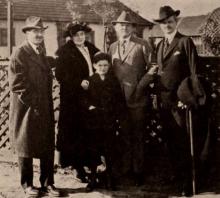 Somewhere in Red Gap
Somewhere in Red Gap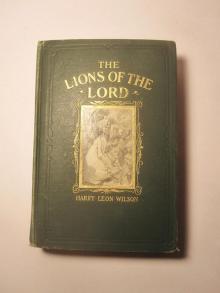 The Lions of the Lord: A Tale of the Old West
The Lions of the Lord: A Tale of the Old West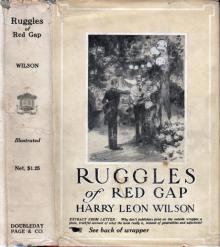 Ruggles of Red Gap
Ruggles of Red Gap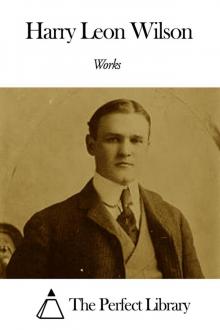 Ma Pettengill
Ma Pettengill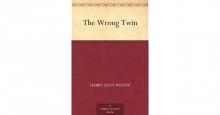 The Wrong Twin
The Wrong Twin